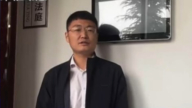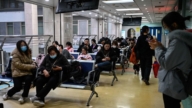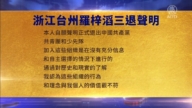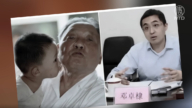【新唐人2011年8月9日讯】北京一家名叫“德育女学馆”的机构,因为一堂《嫁个有钱人》的课程引发争议。这家学馆表示,开设的课程主要在提升女性内涵,名称定为“嫁个有钱人”是因为这个名字更实际。大陆学者评论,这是社会堕落的一种现象。
据“德育女学馆”创始人邵童介绍,学馆于去年(2010年)5月底正式营业,目前共招收过2000多名学员。
而这个“嫁个有钱人”课程,被质疑是否就是叫人“钓大款”?而且课程资质如何界定?学员为何不接受采访?是否提供男女配对?咨询公司办培训是否违规?
邵童表示,他们的课程主要包括婚前及婚后,婚前课程主要有交友、防骗、提高情商爱商、与伴侣沟通的技巧,还有一些课程如化妆、社交礼仪等,“并不是像外界说的教你傍大款,而是提升女性的内涵,帮助她们在婚恋上取得成功。”
对于课程名称,邵童表示,曾想过其他名字,但最终定为《嫁个有钱人》是因为这个名字更实际。
而“德育女学馆”的工作人员丁先生在接受《新唐人》采访时表示,课程是教如何识别真假有钱人,不被欺骗。
丁先生:“我们会告诉她们这种成功男人,一般他们成功的方式是什么样的,个性是什么样的,就告诉她这个。我们界定的这个‘有钱的人’就是比自己的收入高、比自己经济条件要好就算有钱人。一个人要挣2千块 钱,她要嫁一个一个月挣2万的,他就算是有钱人。”
中国独立媒体人高瑜女士认为,这种培训方式是败坏人类的道德。
“这简直是不可想像的,在一些电视的公开节目中竟然公开搞这一套,而且这些,我认为对社会伦理道德的这种重整和重建啊,它是一剂毒药。 而且现在从大学教育,从各方面,它虽然政治课一点没有减,主要让你效忠于中共,但是呢,整个现在这个社会就是为金钱所左右啊,已经是把年轻一代的心灵都腐蚀掉了。”
英国BBC广播电台有文章质疑,“嫁个有钱人”能通过培训实现吗?婚姻讲究的是缘分,要以爱情为基础。最终是不是嫁给了有钱人,根本就与培训无关。
孙文广(前山东大学教授):“那么这种现象呢,说明社会失掉了一些目标了。因为要找朋友应该看他有德有才,这个才是对的,不应该是有钱啊。 这个还是一种社会堕落的一种现象,去追求名利啊,女孩子追求进入豪门,千方百计地用各种方式要嫁一个有钱的人,这是对社会一种腐蚀的现象,腐败的现象了。 ”
据大陆媒体报导,这家企业自去年5月起正式对外营业,7、8月开始招收学员,至今不到1年,但相关负责人自称:“已有过学员约2800名,目前正处迅速发展期。”
新唐人记者常春、林慧心、柏妮采访报导。
Degradation: Marrying for Money
The Beijing-based organization, Deyu Female Institute,
came under fire for promoting a controversy course called,
“Marry a Richman.”
The organization says the course was designed
to enhance the female character,
but Chinese scholars say
the program reflects a definite decline in social morals.
The founder of Deyu Female Institute, Shao Tong, says that
the institute started in May 2010 and now has 2,000 students.
But does the course encourage
females to marry rich men?
How does one assess the quality of this program?
Why do its students avoid media interviews?
Do they provide match making services?
Do teachers break the law during their training classes?
Shao Tong said that their classes teach unmarried women
the techniques of making friends, communicating with men,
cheat-proof techniques, and improving their “EQ in love.”
They also offer make-up classes and socializing skills
“but we do not teach females how to seduce the rich,
but rather we teach them how to improve themselves
and their chances of marrying a rich man.”
Shao Tong said they did consider other names for the program,
however they stuck with, Marry a Richman,
because it sounded more pragmatic.
Mr. Ding, a staff member at the Deyu Female Institute,
told NTD that this class teaches women how to discern
whether a person is truly rich or not, and how not to get fooled.
Mr. Ding: “We tell them how rich people become rich,
what kinds of personalities rich men have, and so on.
We define a Richman as someone who earns a lot of money
and lives a prosperous life.
For example, if a female earns 2,000 yuan (US$310) a month,
and marries someone who earns 20,000 (US$3,100) a month,
then that is what we are talking about.”
Gao Yu, an independent China media professional, said such
training programs are designed to deteriorate people’s morals.
Gao Yu: “It’s unimaginable to have these programs on TV,
which is definitely detrimental to the social norms and morals.
In universities, political courses are still compulsory
and they are tailored so as to compel students
to be loyal to the Chinese Communist Party.
However, the whole society has been influenced by money,
which has had serious consequences on today’s youth.
A BBC radio article questioned the feasibility of
the Marrying a Richman program.
It said that marriage is based on love and affections,
and that the training course could do little
to foster a meaningful marriage.
Sun Wenguang, a former Shandong University professor, said:
“Such phenomenon marks a society that is missing
a fundamental understanding:
When a person gets married, she should not judge her partner
by how much money he earns, but rather on his character.
This is a sign of declining social morals.
It’s morally wrong for females to pursue fame and wealth;
to scheme to marry a rich man
so as to enjoy his material prosperity.”
According to Chinese media, the Deyu Female Institute
opened in May 2010, and began recruiting members in June.
The institute said that in less than one year,
over 2,800 students enrolled and the number is growing.
NTD reporters Chang Chun, Lin Huixin and Bo Ni

























